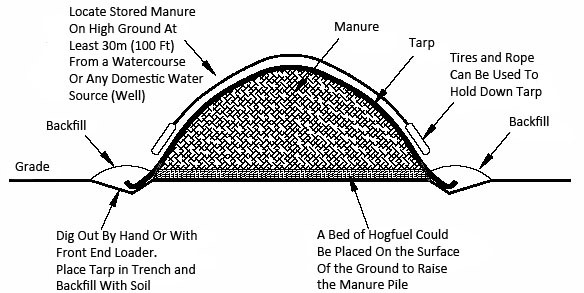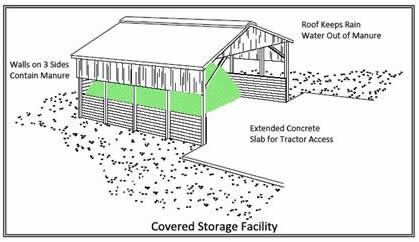Manure Management
ADEC does not regulate most aspects of manure management unless it is causing potential harm to human health or the environment. However, it is important that manure is stored in a manner that does not cause pollution, attraction to animals or insects, or nuisance odors. If not properly managed, rainwater and snow melt can flow through uncovered manure stockpiles and pollute nearby streams, rivers, and groundwater; animals can become a safety hazard or disease vector; and nuisance odors can become a contentious issue between neighbors.
Manure storage systems should be designed and monitored to ensure that runoff will not create these problems. Small farms may be able to field store manure if the stockpile is managed properly. Larger operations will require a storage structure and more extensive waste management to ensure that impacts are prevented until the manure can be removed for use or disposal elsewhere. In accordance with 18 AAC 60.040(b), all sites used to store manure must be located at least 100 feet from any water body or water well.

Field Storage
Best Management Practices for manure stockpiles include:
- Cover in areas receiving more than 25 inches of annual precipitation or where run-off might occur;
- Store no longer than 1 year; and
- Manage to prevent the escape of waste or run-off that may cause pollution.
Storage Facilities
All storage structures should be:
- Designed and operated to contain all manure until it can be removed,
- Constructed with a concrete floor and walls on at least two sides to prevent run-off,
- Designed so that leachate drains to a storage tank or other disposal collection facility,
- Where possible, located out of sight and downwind from public places and neighboring residences, and
- Covered in areas receiving more than 25 inches of annual precipitation.

Other Resources
- Local Governments (Borough, City) may have applicable ordinances.
- USDA Natural Resources Conservation Services - Manure Management https://www.nrcs.usda.gov/wps/portal/nrcs/main/national/plantsanimals/mnm/
Related Statutes and Regulations
Accumulation, storage and disposal of solid waste, including animal waste, must be conducted in a manner to protect public health and in accordance with Title 46 of the Alaska Statutes (AS 46) and Title 18, Chapter 60 of the Alaska Administrative Code (18 AAC 60). The following statutes and regulations apply:
- AS 46.03.710: A person may not pollute or add to the pollution of the air, land, subsurface land, or water of the state.
- AS 46.03.810(a)(2): A person is guilty of creating or maintaining a nuisance if the person allows to be placed or deposited upon any premises owned by the person or under the persons control garbage, offal, dead animals, or any other matter or thing that would be obnoxious or offensive to the public or that would produce, aggravate, or cause the spread of disease or in any way endanger the health of the community.
- 18 AAC 60.010(a): A person may not store accumulated solid waste in a manner that causes
- A litter violation under 18 AAC 64.015;
- the attraction or access of domestic animals, wildlife, or disease vectors;
- a health hazard; or
- polluted run-off water.
- 18 AAC 60.040(b): A person may not dispose of septage, sewage solids, fish waste, animal manure, or animal byproducts or waste on the ground within 100 feet of a well that produces water suitable for drinking.

 Indicates an external site.
Indicates an external site.